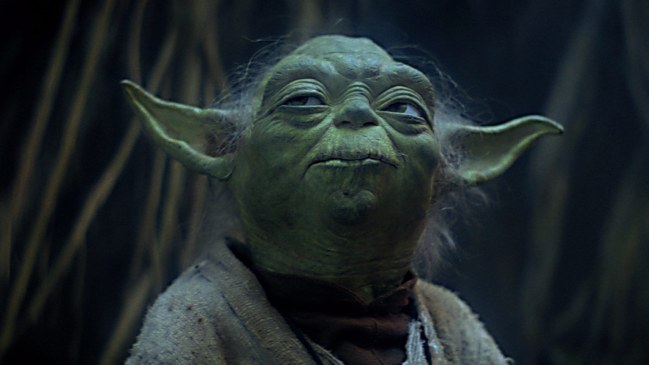The 16th annual TCM Classic Film Festival got off to a roaring start Thursday night, screening one of the greatest movies ever made in one of the greatest venues in the country with one of the most influential filmmakers of all time in attendance.
The movie: the 1980 sci-fi classic “The Empire Strikes Back.” The venue: the glorious TCL Chinese Theatre on Hollywood Boulevard. The filmmaker: George Lucas, appearing for a rare pre-show Q&A to discuss the making of his “Star Wars” sequel and why he felt financial — but not creative — pressure following up what was then the most commercially successful film in history.
In a conversation with Turner Classic Movies host Ben Mankiewicz, Lucas explained that he never felt intimidated by the prospect of failing to live up to “Star Wars,” because he had written the story for “Empire” long before the first film became an unexpected hit. “When I write, it’s like a blueprint — there’s not great deal of detail in it,” Lucas said. “As it turned out, when I got the ‘Star Wars’ script done, there were 180 pages. So I cut it into three parts and said I’ll focus on the first one, because we’d never get enough money to make the whole thing.”
Lucas credited Fox executive Alan Ladd Jr. with giving “Star Wars” the green light at a time when no one — including Lucas himself — knew exactly what the movie was going to be. Ladd just wanted to be in business with the guy who had directed “American Graffiti,” which Lucas said was the most profitable movie ever made at that point in relation to its cost. “It cost $700,000 and it made over a hundred million. Alan Ladd said, ‘You’re really talented. I want to make a movie with you.’ This never happens.”
Lucas was determined to make all three of his “Star Wars” stories no matter what, and negotiated a deal in which he kept the sequel rights so that he could produce “The Empire Strikes Back” and “Return of the Jedi” elsewhere if the first movie wasn’t successful or Fox just wasn’t interested in continuing the series. Lucas took a lower fee than he would ordinarily have gotten as a filmmaker coming off of a huge hit in exchange for the sequel and merchandising rights — a gamble that not only allowed him to make the sequels on his own terms, but ultimately made him a billionaire.
“I said, ‘I want the rights for these things because I’m going to make those movies no matter what happens,’” Lucas said. “‘And besides that, I want the licensing.’ They said, ‘What’s licensing?’” Lucas’ idea was to use merchandising to help promote the movies, with kids wearing “Star Wars” shirts that would help spread the word. “Fox was shocked when on the first day the lines were all around the block. ‘Where’d these people come from?’ Because they hadn’t really run a campaign.”
Indeed, amazingly enough, no one at the studio but Ladd really believed in the movie, which Lucas said wasn’t unusual for “Star Wars,” which even his friends thought was a strange film for him to be making. “I certainly didn’t think it was going to make any money,” Lucas said, but he added that when it did make money it put him in an unusual position maintaining ownership of the sequels. “I said, I’m going to do it myself. I’m going to go to the bank, I’m going to get the money.”
Lucas self-financed “Empire,” with Fox staying on as a distributor, and that’s where the real risk came in — he wasn’t worried about the movie measuring up to “Star Wars” creatively, but had it bombed financially he would have been ruined.
Luckily, “The Empire Strikes Back” was a huge hit as well as an artistic success, one of the few sequels to a classic film that is commonly agreed upon to be as good as if not superior to its predecessor. The film’s power was on full display at the Chinese Thursday night, with a packed crowd (one that included many of Lucas’ directing peers, like his USC classmate Randal Kleiser, Joe Dante, John Landis, Ernest Dickerson, and Alexander Payne) enthralled by the spectacle, and audibly entertained by the sequel’s new characters like Yoda and Lando Calrissian.
Mankiewicz wrapped the discussion up by asking Lucas why Yoda “talks backwards,” and Lucas had a simple answer. “Yoda had a very distinctive way of speaking, and that was done purposely,” Lucas said. “If you’re speaking regular English, people don’t listen that much. But if it’s hard to understand what someone is saying, people focus on it. Yoda was basically the philosopher of the movie, and I had to figure out a way to get people to actually listen to these long talking scenes, especially 12-year olds.”
Lucas concluded by talking about how difficult writing is, and what his friend and mentor Francis Coppola taught him about the importance of a good screenplay. “He said, ‘Look, the first draft’s gonna be horrible. You’re gonna want to commit suicide. The second draft will be bad. The secret to doing a good script is to rewrite, rewrite, rewrite. Don’t stop and say it’s good enough. Because there’s nothing that is good enough.”
The TCM Classic Film Festival continues through Sunday with more in-person appearances, including Michelle Pfeiffer with “The Fabulous Baker Boys,” Rob Reiner with “Misery” and “The American President,” and Al Pacino and Michael Mann with “Heat.”



